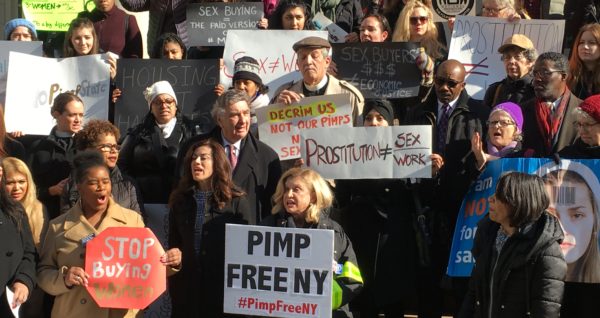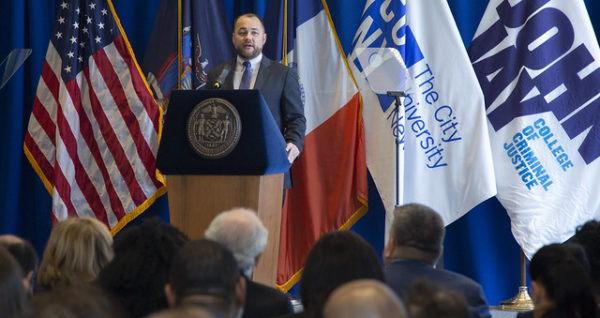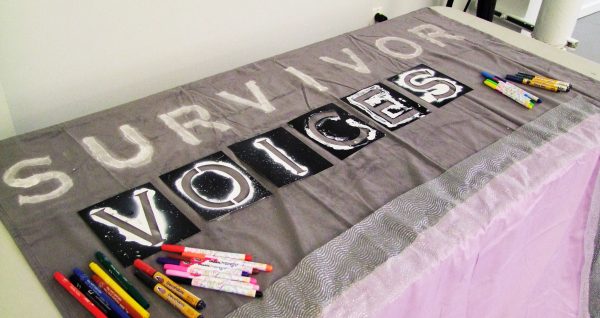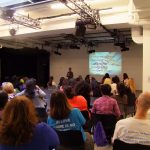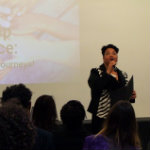Our joint statement on Speaker Johnson’s Call for the Equality Model
Speaker Johnson’s Call for the Equality Model is the right step to protect and promote the well-being of those who are sex trafficked and individuals in the sex trade while holding accountable those who harm them.
As leading direct service providers, women’s rights, anti-trafficking and youth activists, immigrant, gender and racial justice advocates, child welfare advocates, and sex trade survivors, we applaud City Council Speaker Corey Johnson for his leadership in calling for meaningful criminal justice reform in New York City.
In particular, we commend the Speaker’s support for the repeal of the “loitering for purposes of engaging in prostitution” offense, which permits law enforcement to make often arbitrary arrests based on untenable suspicions of prostitution. These arrests have been used as a discriminatory tactic and reports show that the law’s usage disproportionately targets women and girls of color as well as transwomen and girls.
Speaker Johnson also declared his support for the Equality Model (also known as the Nordic Model) and called for urgent action in addressing prostitution and sex trafficking. This legal framework solely decriminalizes people in prostitution while only targeting those who harm them, including pimps and sex buyers.
Key to the Equality Model is its directive to create and implement comprehensive services, including trauma-informed medical and mental health services, housing, education, and job training, for all people in prostitution. Speaker Johnson’s announcement concerning his commitment to opening a center that will provide wrap-around services to individuals in the sex trade is an important step in the right direction.
New York City prides itself in being at the forefront of protecting human rights, especially those of the most marginalized populations among us. The overwhelming majority of those in prostitution are marginalized women, girls, transwomen and girls, especially of color. In our city, most of these individuals are New Yorkers; others are undocumented immigrants who have likely been sex trafficked. Many of us are part of and all of us work with these communities.
The Equality Model’s goal is to promote and protect the economic security, health and social equality of the most disenfranchised women and transwomen while safeguarding them from violence and discrimination. In tandem with providing comprehensive services, the City must also invest in education and training, and commit to changes in policy and practice to eradicate discrimination and mistreatment by law enforcement and the judicial system. Already, due to grassroots efforts, we’ve seen improvements. Through training and engagement with law enforcement, arrests of pimps and traffickers have slowly increased since 2016 when the NYPD committed to targeting “pimps and johns” and investing in long-term investigations, while arrests of individuals selling sex have steadily decreased each year.
The sex trade is where sex trafficking happens. Every dollar that feeds the multi-billion dollar sex trade comes from sex buyers who treat people in the sex trade like commodities and cause immense, long-term harm. The Speaker courageously recognized that the sex trade is inherently antithetical to equality for all and affirmed that we have the power to fight it.
The Equality Model must be part of New York’s toolkit of laws and policies to reform the criminal justice system and promote gender, racial, economic and immigration justice.
—
Gloria Steinem
Coalition Against Trafficking in Women
Covenant House
ECPAT-USA
Equality Now
Graham Windham
Mentari
National Organization for Women – New York City
New York Alliance Against the Legalization of Prostitution
New York State Anti-Trafficking Coalition
Not On My Watch
Sanctuary for Families
